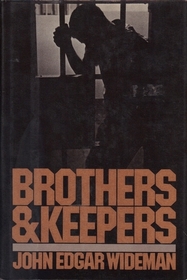From Publishers Weekly
Wideman, novelist and professor at the University of Wyoming, seeks to understand how he and his brother, who is serving a life sentence for murder, could have such disparate lives after a childhood together in a Pittsburgh ghetto. Ruthless about himself, particularly about his move into the upper middle-class as a "black intellectual," Wideman characterizes his brother as an intelligent, loving, proud dreamer. He raises "existential questions" about culture, racism and the "grief and guilt of a brother," PW wrote. November
Copyright 1985 Reed Business Information, Inc.--
Wideman, novelist and professor at the University of Wyoming, seeks to understand how he and his brother, who is serving a life sentence for murder, could have such disparate lives after a childhood together in a Pittsburgh ghetto. Ruthless about himself, particularly about his move into the upper middle-class as a "black intellectual," Wideman characterizes his brother as an intelligent, loving, proud dreamer. He raises "existential questions" about culture, racism and the "grief and guilt of a brother," PW wrote. November
Copyright 1985 Reed Business Information, Inc.--
Slogged through 'Brothers and Keepers' by John Edgar Wideman which gave me indigestion. If Wideman honestly intended to present his brother's circumstances, decisions, and resulting incarceration in an honest and helpful light he missed the boat. However he would probably have us think that someone of another race stole the boat and hid it from him. To review this pile of whine feels like a waste of time, but my general comments are that it not only comes from a place most thinking folks don't go, it also doesn't have particularly good organization or use of words. While it would not prevent me from looking into another of his books it sure would not entice me to do so without carefully checking subject matter as I didn't find his phrasing and ability to express himself particularly impressive. This is surprising considering the honors he's won.
The book supposedly deals with acts of his younger brother, who committed a murder while trying to just commit a plain old robbery. The brother's voice (presented by Wideman) is far more articulate than the authors. It appears the brother understands both his motivation and his mistake. The author appears to think the worst part of the brother's situation is that his prison visitors are subject to body scans (which the author points out are 'humiliating and degrading' to women who wear underwire bras), and who thinks underwires and other sharp metal objects should be imported into prisons to avoid this humiliation. He has a number of other unrealistic ideas about how incarceration and dignity work, never considering that dignity is an internal quality. He also seems quite unclear on the concept of respect. It is evident that his respect for his brother is somewhat tempered by his constant intrusion into the dialogue and flow between them. He prefers to dwell on his idea that society is all about putting down people of his race.
Every time the college-educated author speaks we get a dose; every time the thug brother speaks about his life the book makes sense. I give two stars only to the brother's portion, which comprises about 5% of the book. Wideman should have let his murderer, dropout, thug brother write a whole lot more of the book as those portions are much more coherent. They have an interesting story to tell, if we could get past the dull whine of 'lack of opportunity' from a person who has actually achieved an above-average return upon his efforts in this world.
The book supposedly deals with acts of his younger brother, who committed a murder while trying to just commit a plain old robbery. The brother's voice (presented by Wideman) is far more articulate than the authors. It appears the brother understands both his motivation and his mistake. The author appears to think the worst part of the brother's situation is that his prison visitors are subject to body scans (which the author points out are 'humiliating and degrading' to women who wear underwire bras), and who thinks underwires and other sharp metal objects should be imported into prisons to avoid this humiliation. He has a number of other unrealistic ideas about how incarceration and dignity work, never considering that dignity is an internal quality. He also seems quite unclear on the concept of respect. It is evident that his respect for his brother is somewhat tempered by his constant intrusion into the dialogue and flow between them. He prefers to dwell on his idea that society is all about putting down people of his race.
Every time the college-educated author speaks we get a dose; every time the thug brother speaks about his life the book makes sense. I give two stars only to the brother's portion, which comprises about 5% of the book. Wideman should have let his murderer, dropout, thug brother write a whole lot more of the book as those portions are much more coherent. They have an interesting story to tell, if we could get past the dull whine of 'lack of opportunity' from a person who has actually achieved an above-average return upon his efforts in this world.




